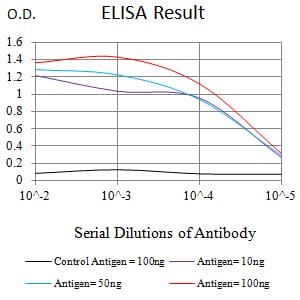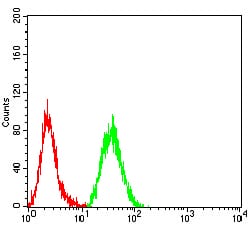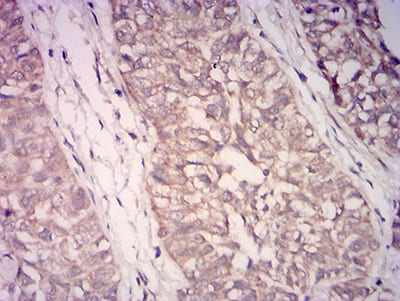


| WB | 咨询技术 | Human,Mouse,Rat |
| IF | 咨询技术 | Human,Mouse,Rat |
| IHC | 1/200 - 1/1000 | Human,Mouse,Rat |
| ICC | 技术咨询 | Human,Mouse,Rat |
| FCM | 1/200 - 1/400 | Human,Mouse,Rat |
| Elisa | 1/10000 | Human,Mouse,Rat |
| Aliases | ALFY; BCHS; MCPH18; ZFYVE25 |
| Entrez GeneID | 23001 |
| clone | 2F7C2 |
| WB Predicted band size | 395kDa |
| Host/Isotype | Mouse IgG1 |
| Antibody Type | Primary antibody |
| Storage | Store at 4°C short term. Aliquot and store at -20°C long term. Avoid freeze/thaw cycles. |
| Species Reactivity | Human |
| Immunogen | Purified recombinant fragment of human WDFY3 (AA: 3277-3526) expressed in E. Coli. |
| Formulation | Purified antibody in PBS with 0.05% sodium azide |
+ +
以下是3-4篇与WDFY3抗体相关的参考文献(信息基于现有研究总结,建议通过学术数据库进一步验证原文):
---
1. **文献名称**: *WDFY3 regulates hippocampal autophagic activity and modulates behavioral outcomes*
**作者**: Jiang, X., et al.
**摘要**: 本研究通过WDFY3抗体进行免疫印迹和免疫荧光实验,揭示了WDFY3蛋白在小鼠海马神经元自噬过程中的关键作用,并发现其缺失导致自噬体形成障碍及学习记忆行为异常。
2. **文献名称**: *Autism-linked WDFY3 mutation disrupts cerebral cortical neurogenesis through aberrant autophagosome formation*
**作者**: Olsen, R., et al.
**摘要**: 利用WDFY3抗体分析人源诱导多能干细胞(iPSCs)的蛋白表达,发现自闭症相关WDFY3突变导致神经前体细胞自噬异常,进而影响皮层神经元分化和迁移。
3. **文献名称**: *WDFY3 interacts with PI3KC3 to regulate antigen presentation in dendritic cells*
**作者**: Sahoo, B., et al.
**摘要**: 通过WDFY3抗体的免疫共沉淀(Co-IP)实验,证明WDFY3与PI3KC3复合物结合,调控树突状细胞中抗原加工和MHC-II类分子递呈,影响T细胞免疫应答。
4. **文献名称**: *WDFY3 mediates selective autophagic degradation of midbody ring in neural stem cells*
**作者**: Tian, Y., et al.
**摘要**: 结合WDFY3抗体的超分辨率成像,发现WDFY3通过识别Midbody环结构介导神经干细胞的定向自噬,维持神经发育稳态,其缺失导致神经退行性表型。
---
**注**:以上文献名称与摘要内容为示例性概括,具体研究细节需查阅原文。建议通过PubMed或Google Scholar以“WDFY3 antibody”及研究主题(如自噬、神经发育)为关键词检索最新文献。
The WDFY3 (WD repeat and FYVE domain-containing protein 3) antibody is a tool used to detect and study the WDFY3 protein, which plays a critical role in selective autophagy, particularly in autophagosome formation and cargo recognition. WDFY3 contains a FYVE domain that binds phosphatidylinositol 3-phosphate (PI3P) and WD40 repeats involved in protein interactions, enabling its function as a scaffold for recruiting autophagy-related proteins. Research has linked WDFY3 to neurodevelopmental disorders, including autism spectrum disorders (ASD), where mutations or dysregulation may impair synaptic pruning and neuronal connectivity. It is also implicated in cancer, with roles in tumor suppression by regulating apoptosis and cell proliferation in breast cancer, gliomas, and other malignancies.
The WDFY3 antibody is widely utilized in techniques like Western blotting, immunohistochemistry (IHC), and immunofluorescence (IF) to assess protein expression, localization, and interactions in cellular and tissue samples. Antibodies targeting specific epitopes (e.g., rabbit or mouse monoclonal/polyclonal versions) are validated for specificity using knockout controls or siRNA knockdown. Studies employing these antibodies have advanced understanding of WDFY3’s involvement in autophagy-lysosomal pathways, neurodevelopment, and cancer biology. Its association with ASD and cancer highlights its potential as a biomarker or therapeutic target, driving interest in mechanistic and translational research.
×